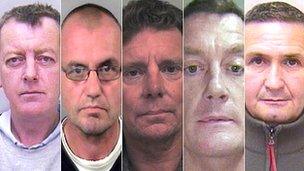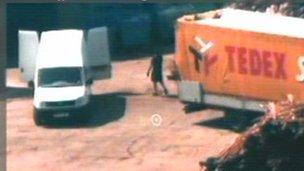Leicestershire fake vodka gang jailed
- Published

A fifth member of the gang received a suspended jail sentence
Four men have been jailed for running an illegal vodka distillery operation from a Leicestershire farm.
John Humphreys, 46, of Newark, and Michael Matthews, 56, of Weston-super-Mare, were convicted of conspiracy to cheat the revenue.
James Fyfe, 41, from Nottingham, and Kevin Eddishaw, 54, from Southwell in Nottinghamshire, admitted the offence.
The trial heard that the men - who evaded up to £1.5m of duty - could easily have caused an explosion.
Eddishaw and Humphreys were both jailed for seven years at the sentencing hearing at Hull Crown Court, while Matthews, who printed labels and boxes, was given an 18-month sentence.
Bleach used
Fyfe, of Furlong Avenue, Arnold, who ran the production line was sentenced to 16 months in prison.
Humphreys, of Main Street, Upton, and Matthews, of Stanley Grove, were convicted at a trial at Nottingham Crown Court, while Eddishaw, of Handford Court, changed his plea to guilty during the trial.
A fifth man, Mark Gyles, 48, of Belleville Drive, Nottingham, who transported the goods, was given a one-year sentence, suspended for 12 months, and ordered to carry out 300 hours of unpaid work.
The trial heard the illegal vodka factory was hidden in an industrial unit on a farm near Little Dalby in Melton Mowbray.
Officers from Her Majesty's Revenue and Customs seized more than 9,000 bottles of counterfeit vodka, along with fake labels and manufacturing equipment.
Revenue and Customs released a chart outlining the men involved in the fake vodka factory, external, who were tracked by police working for Operation Baygood.
Officers also seized 25,000 litres of denatured alcohol - also known as methylated spirits - enough to make 100,000 bottles of vodka.

The Customs raid in September 2009 followed a five-month surveillance operation
Denatured alcohol is used as a solvent and contains hundreds of additives. It is coloured purple to distinguish it from drinkable alcohol and is not fit for human consumption.
Bleach was used by the gang to remove the colouring to make it clear before diluting to the required strength.
The court heard there was a complete lack of any fire safety measures in the unit, posing a serious hazard.
The alcohol vapour alone could have triggered a major explosion if the lights had been switched on or a naked flame or cigarette had been lit, the court heard.
HM Revenue and Customs spokesman Simon De Kayne said after sentencing: "The gang were fully aware the counterfeit vodka they manufactured contained highly dangerous chemicals, making it unfit for human consumption, but were interested only in making a profit at the expense of British taxpayers."
A sixth man, Polish national Wojciech Herbst, 55, who was convicted of the same charge, is due to be sentenced on 5 December.
- Published25 November 2011
- Published3 November 2011